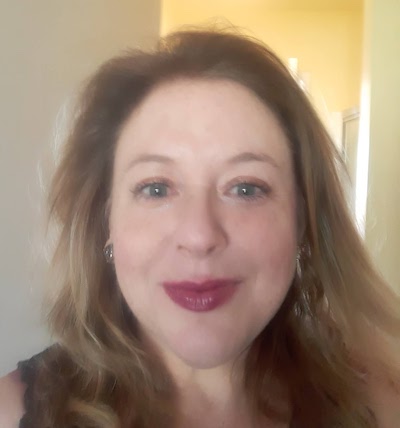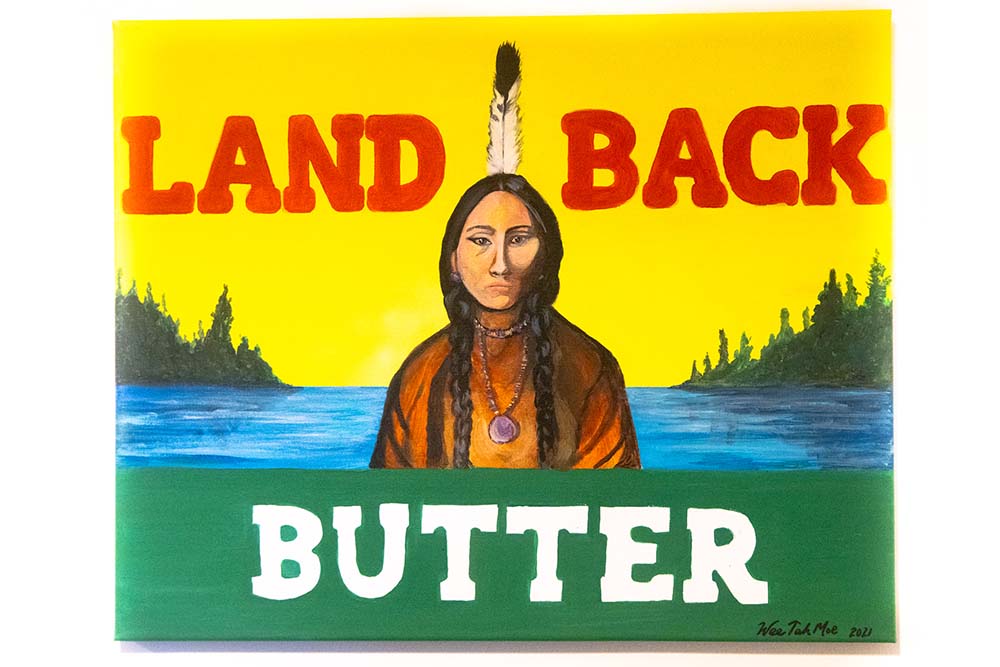
- Details
- By Tamara Ikenberg
This weekend and next week, Indian Country is a kaleidoscope of folklore, fine art, and funny business.
Must-see moments include Ojibwe storytelling for the snowy season, strong artistic statements from the Shinnecock Nation, some quality time with the notorious Auntie Beachress, and an environmentally-conscious conversation with one of the most fascinating photographers in Indian Country.
Let Native News Online’s event round-up prepare you for a well-rounded week of Indigenous insights and adventures.
Outcropping - Indigenous Art Now
WHEN: Friday, Feb. 4 through April 9
WHERE: Southampton Arts Center, 25 Jobs Lane, Southampton, New York; Event page
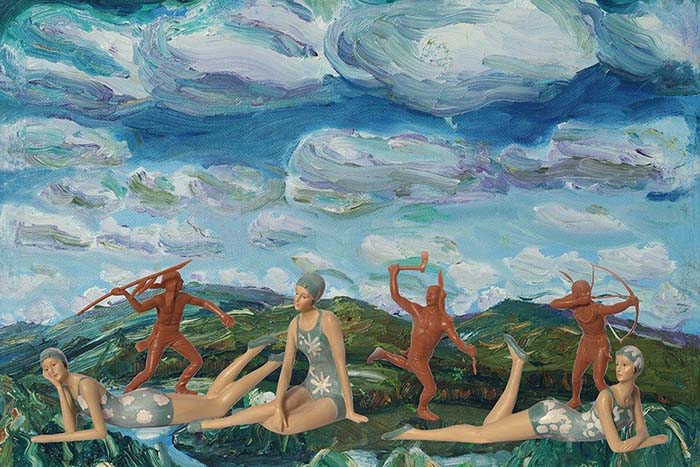 Day at the Beach (from Toys Aren’t Us) by Mohawk artist Shelley Niro is featured in Outcropping – Indigenous Art Now”opening February 4 at Southampton Arts Center in Southampton, NY. (Jeremy Dennis)
Day at the Beach (from Toys Aren’t Us) by Mohawk artist Shelley Niro is featured in Outcropping – Indigenous Art Now”opening February 4 at Southampton Arts Center in Southampton, NY. (Jeremy Dennis)
If you would rather slather your bread with Land Back Butter instead of Land O’ Lakes, the new exhibit Outcropping: Native Art Now is the show you’ve been craving.
The exhibit features work from a variety of Indigenous artists, with a concentration on Shinnecock Nation artists like Denise Silva Dennis, who is also the mother of exhibit curator Jeremy Dennis.
“Land Back Butter is a homage to the popular brand, Land O’Lakes Butter,” which featured an Indigenous woman named Mia from 1928 - 2020. “Mia’s image, sitting in front of a pristine lake, framed by an exquisite pine tree forest, was unceremoniously erased from the popular brand… and replaced with red, bold lettering, ‘Farmer Owned,’” Silva Dennis told Native News Online. “(The painting) is a reflection of all that I am as an Indigenous woman while paying homage to all Indigenous women. We women and men are the stewards of the land and no one, especially colonizers, should ever forget it! While spreading that butter on the slice of morning toast, reflect on the Land Stolen/Land Back movement that is gaining strength all across the country!”
Silva Dennis’ work also represents the long standing struggles between the tribe and the glitzy Hamptons communities that have stolen sacred land, and the eternal Shinnecock connection to the region.
Another strong statement is Mohawk artist Shelley Niro’s “Day at the Beach (from Toys Aren’t Us),” a study in contrasts coupling settler sunbathers without a care in the world, enjoying the splendor of the stolen land, with insulting, racist Indian toys wielding weapons.
Other featured artists in Outcropping include Pauline Leilani Badamo, Tecumseh Ceaser, Jaida Grey Eagle, Ian Kuali’i, Cannupa Hanska Luger, Ella Mahoney, David Bunn Martine, Tricia Rainwater, Skawennati, and Shane Weeks.
Conversations and Connections with Cara Romero
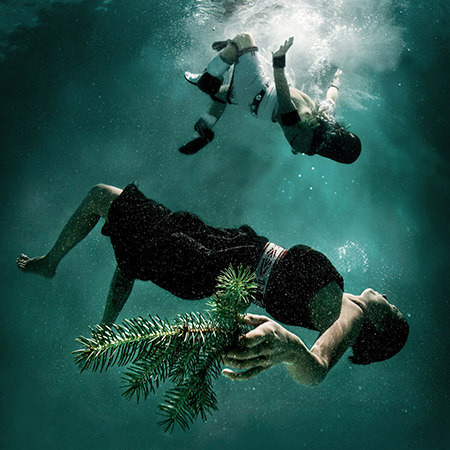 Images from Chemehuevi photographer Cara Romero's Water Memories series are featured in the exhibition This Land: American Engagement with the Natural World at the Hood Museum of Art in Hanover, NH. On Wednesday, Feb. 9, Romero will discuss the series during an installment of "Conversations and Connections." (Cara Romero) WHEN: Wednesday, Feb. 9, 9:30 a.m.
Images from Chemehuevi photographer Cara Romero's Water Memories series are featured in the exhibition This Land: American Engagement with the Natural World at the Hood Museum of Art in Hanover, NH. On Wednesday, Feb. 9, Romero will discuss the series during an installment of "Conversations and Connections." (Cara Romero) WHEN: Wednesday, Feb. 9, 9:30 a.m.
WHERE: Hood Museum of Art, 6 E. Wheelock St., Hanover, NH; Event page
The politics of place, resources, and land-based identity are at the core of the Hood Museum of Art exhibit This Land: American Engagement with the Natural World.
No one captures the Native connection to nature and land quite like Chemehuevi photographer Cara Romero, whose work figures prominently in the exhibit.
Her eco-focused photos “Oil Boom,” depicting a Native dancer seemingly buried under a bleak row of oil pump jacks, and “Water Memories,” showing two Indigenous people free-falling through a liquid dreamscape, are deeply affecting visual meditations on pre-contact Indigenous relationships with water and oil, and how they contrast with modern methods of extraction and hydroelectric development that have displaced and depressed Native people.
On Wednesday, Romero along with Jami Powell, the Hood Museum’s curator of Indigenous art, will wade deeper into the Water Memories series and Romero’s photographic practice during an installment of Conversations and Connections.
Twenty-twenty two is already shaping up to be a major year for Romero. Her solo show Mythos and Sub-Pop is on display at the Juanita Harvey Art Gallery at Midwestern State University in Wichita Falls,Texas. She is also involved in Outcropping - Indigenous Art Now At the Southampton Arts Center, in Southampton, New York. And in April, her work will be featured in the Our Selves: Photographs by Women Artists from Helen Kornblum exhibit at the Museum of Modern Art in New York City.
Virtual Ojibwe Storytelling Series: Biskakone Greg Johnson
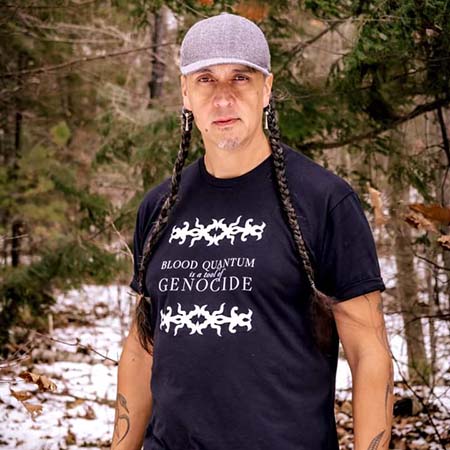 The Wisconsin Historical Society's Virtual Ojibwe Storytelling Series: will feature Biskakone Greg Johnson (Lac du Flambeau band of Lake Superior Chippewa Indians) on Tuesday, Feb. 8. (Biskakone Greg Johnson) WHEN: Tuesday, Feb. 8, 7 p.m.
The Wisconsin Historical Society's Virtual Ojibwe Storytelling Series: will feature Biskakone Greg Johnson (Lac du Flambeau band of Lake Superior Chippewa Indians) on Tuesday, Feb. 8. (Biskakone Greg Johnson) WHEN: Tuesday, Feb. 8, 7 p.m.
WHERE: Event page; Register here
Winter is the season for storytelling, and every Ojibwe band shares one unifying ground rule.
“You have to tell stories when there is snow on the ground. The ground is frozen and you can’t be out and about … that’s the rule,” Liz Arbuckle Wabindato, the northern outreach coordinator for the Wisconsin Historical Society, and a member of the Bad River Band of Lake Superior Chippewa told Madison365.
To celebrate storytelling season, the Wisconsin Historical Society is offering a virtual platform to some of the most skilled and authentic story-spinners in Indian Country.
“These presenters are such wonderful resources and they come to the local schools and they share their time all of the time,” Wabindato said.
On Tuesday, the Virtual Ojibwe Storytelling Series will feature Biskakone Greg Johnson of the Lac du Flambeau band of Lake Superior Chippewa Indians.
A school teacher, hunter, gatherer, spearfisherman, and fierce advocate for treaty rights, Johnson loves sharing his passion for traditional Anishinaabe lifeways with communities throughout the Great Lakes region.
So, why exactly is winter the storytelling season? There are a variety of reasons, according to Wabindato.
“I’ve heard it told that we tell stories at this time because things are very quiet. The animals we are talking about can’t hear us … because they are hibernating. I’ve also heard it told the opposite way – ‘Well, it’s very important that when our spirits have more time that they can sit with us while we tell stories,’” she said.
“And then I heard it the third way, which is that it’s a really practical and logical way to tell stories because, during the other three seasons, we don’t have time to be just sitting around telling stories. You need to be working and securing food for those long winter months, I respect all three of those versions. It’s different traditions of different bands.”
Michael Laughing Fox Charette of the Red Cliff Band of Lake Superior Chippewa, was the first storyteller featured in the series.
Watch Ojibwe Storytelling Series session 1 from Wisconsin Historical Society on Vimeo.
Native Comedy Night
WHEN: Sunday, Feb. 6, 7:30 p.m.
WHERE: Spokane Comedy Club, 315 W. Sprague Ave., Spokane, WA; $25 general admission, $60 VIP; Purchase tickets here.
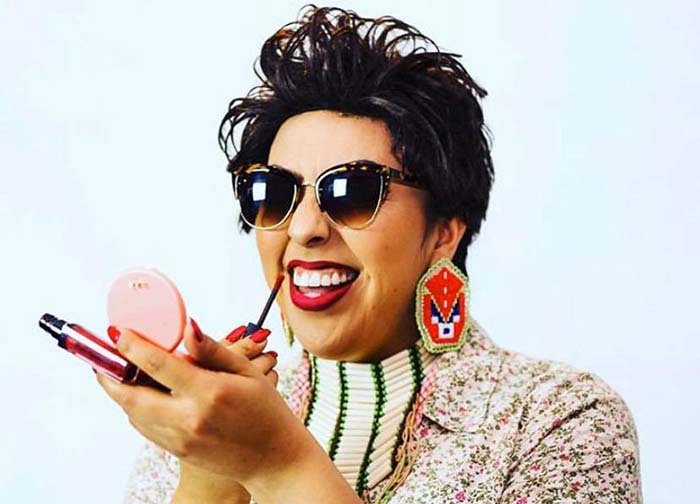 Lakota, Dakota and Hidatsa comedian Tonia Jo Hall, aka Auntie Beachress, will perform at Native Comedy Night on Sunday, Feb. 6 at the Spokane Comedy Club in Spokane, WA. (Tonia Jo Hall)
Lakota, Dakota and Hidatsa comedian Tonia Jo Hall, aka Auntie Beachress, will perform at Native Comedy Night on Sunday, Feb. 6 at the Spokane Comedy Club in Spokane, WA. (Tonia Jo Hall)
“Auntie Beachress” is an enigma wrapped in red lipstick and sunglasses. One minute she’s imparting priceless advice about self confidence, and the next minute she’s getting dragged out of a powwow by security guards for cheering too loud during the dance competition–or at least that’s why she claimed she was thrown out.
On Sunday, the hilarious hot mess Beachress will bring her wacky words of wisdom to the Spokane Comedy Club, where she will be joined by WhiteClay Nation comedian Kasey “Rezzalicious” Nicholson.
Beachress is the alternate identity of Hidatsa, Lakota and Dakota comedian and motivational speaker Tonia Jo Hall, who has been relating to audiences both live and online as the bawdy Beachress for more than a decade.
More Stories Like This
Watermark Art Center to Host “Minwaajimowinan — Good Stories” ExhibitionMuseums Alaska Awards More Than $200,000 to 12 Cultural Organizations Statewide
Zuni Youth Enrichment Project Takes Top Emerging Artist Apprentices to Phoenix for Artistic Exploration and Cultural Immersion
From Dishwasher to Award-Winning Chef: Laguna Pueblo's Josh Aragon Serves Up Albuquerque's Best Green Chile Stew
Rob Reiner's Final Work as Producer Appears to Address MMIP Crisis
Help us defend tribal sovereignty.
At Native News Online, our mission is rooted in telling the stories that strengthen sovereignty and uplift Indigenous voices — not just at year’s end, but every single day.
Because of your generosity last year, we were able to keep our reporters on the ground in tribal communities, at national gatherings and in the halls of Congress — covering the issues that matter most to Indian Country: sovereignty, culture, education, health and economic opportunity.
That support sustained us through a tough year in 2025. Now, as we look to the year ahead, we need your help right now to ensure warrior journalism remains strong — reporting that defends tribal sovereignty, amplifies Native truth, and holds power accountable.
 The stakes couldn't be higher. Your support keeps Native voices heard, Native stories told and Native sovereignty defended.
The stakes couldn't be higher. Your support keeps Native voices heard, Native stories told and Native sovereignty defended.
Stand with Warrior Journalism today.
Levi Rickert (Potawatomi), Editor & Publisher

